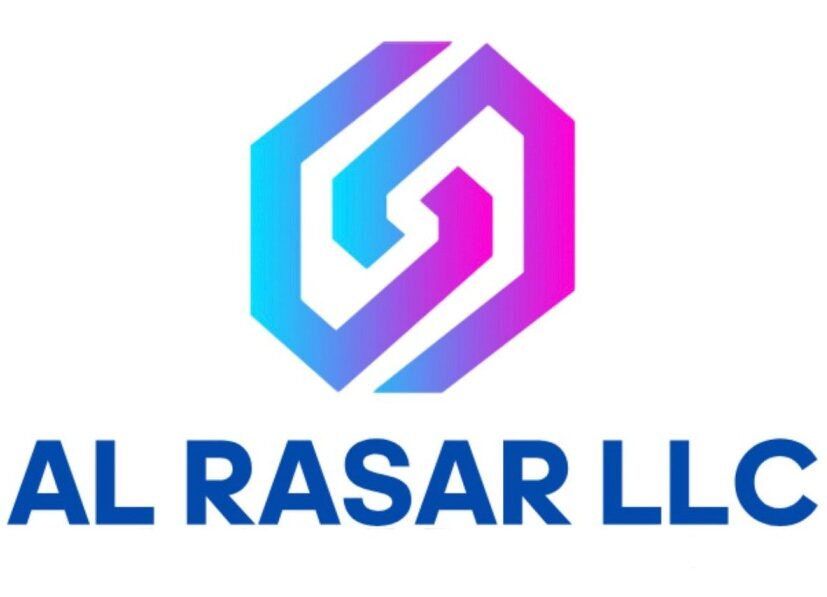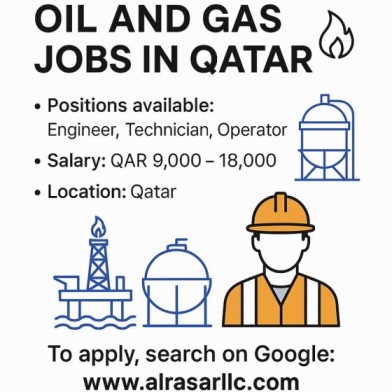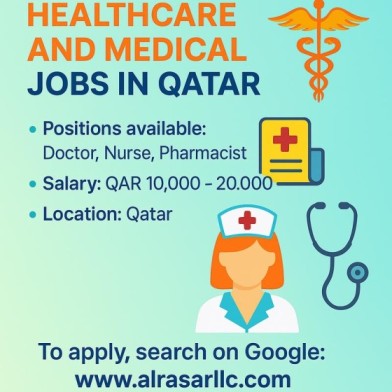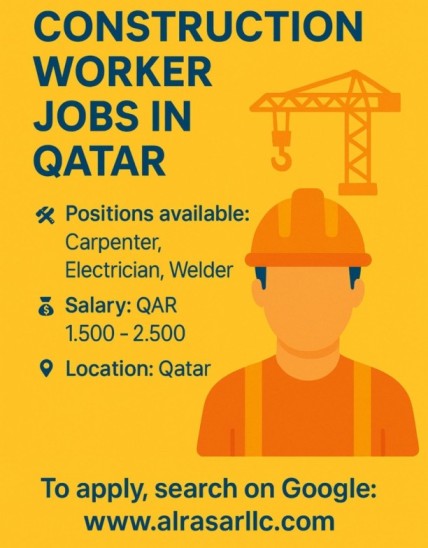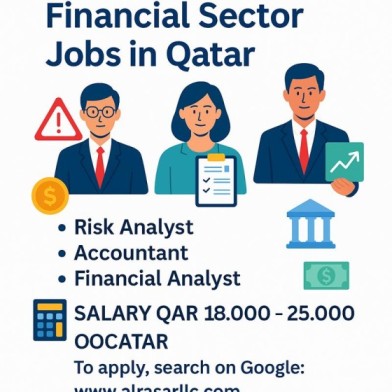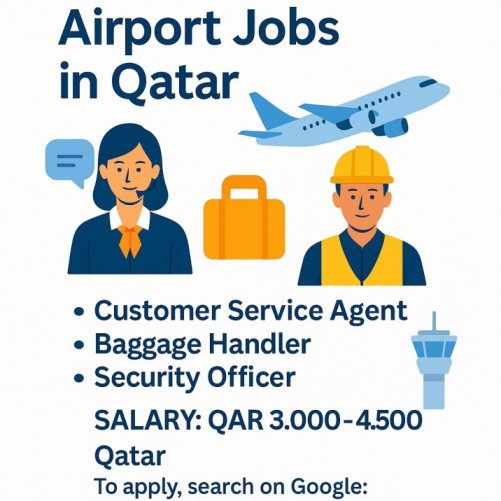Oil & Gas Jobs in Qatar
The oil and gas industry in Qatar is still one of the best ways to find work in the Middle East. Qatar’s energy sector will have thousands of job openings for trained workers, engineers, and support staff in 2025. This is because Qatar has the world’s third-biggest natural gas reserves and is one of the largest exporters of LNG.
Why should you work in Qatar’s oil and gas industry?
High Salary Potential (Tax-free)
Jobs with Multinational Companies (such Qatar Energy, ExxonMobil, TotalEnergies, and Shell)
Free Visa and Accommodation Benefits
Long-term projects to expand LNG
Great for skilled expats in engineering and technical fields
Skills and qualifications needed
For engineering jobs, you need a Bachelor’s degree in engineering (mechanical, electrical, petroleum, or instrumentation).
For safety jobs, you need a NEBOSH/IOSH certification and field experience.
For technicians, you need an ITI/Diploma in a relevant craft.
You need to be able to speak and write English well.
It would be helpful if you have worked in the oil and gas industry before.
Benefits of Oil and Gas Jobs in Qatar
Work in shifts (28/28 or 35/35 days)
Free food and housing
Medical and insurance coverage
Family Visa (for some jobs)
Free plane tickets every year
Opportunities for career growth on global projects
Healthcare and Medical Jobs in Qatar
The healthcare system in Qatar is one of the best in the Middle East. It has world-class hospitals, clinics, and research centers. In 2025, there is a record high need for healthcare workers, according to the Ministry of Public Health and state goals such the Qatar state Vision 2030.
This page talks about medical positions that are in high demand, their pay, what you need to do to get one, and how to apply.
Why Work in Healthcare in Qatar?
Salaries that are tax-free
Hospitals that are accredited (JCI-certified)
Free housing and a family visa for senior positions
Job security for a long time
A diverse workforce
Licenses and Qualifications
For doctors: an MBBS, a residency, and a specialist license (QCHP).
For nurses: a BSc in nursing, a Prometric test, a Dataflow test, and a QCHP license.
For pharmacists and technicians: a degree, a Prometric test, and Qatar Council registration.
Good English skills (IELTS is often needed)
Advantages and Benefits
Nurses get free housing and food
Senior personnel get family visas
They get annual air tickets
They get paid time off and sick days
They get CME (Continuing Medical Education) support
Tips for Faster Hiring
Finish your Prometric and Dataflow ahead of time.
Keep scanned copies of your passport, experience certificates, and license.
Make sure all of your documents are signed and translated if necessary.
Be ready for virtual interviews.
Construction workers jobs in Qatar
significant infrastructural investments are making a significant difference in Qatar. Smart cities, stadiums, motorways, and free zones are all part of these schemes. As long as people keep investing money into real estate, logistics, and transportation, there will be a high need for competent personnel in construction until 2025.
Civil engineers, technicians, and workers have high job prospects in Qatar. The salary is good, the money is tax-free, and the contracts last for a long period.
Why should you work in construction in Qatar?
No taxes on salary and bonuses
The best projects (Lusail City, Hamad Port, Metro Expansion)
The company pays for visas, accommodation and transportation
Engineers and foremen can move up in their careers
There is a significant demand for certified safety and site specialists
What skills and certifications you need
Civil/Structural Engineers: B.E./B.Tech + experience on site
Foremen & Supervisors: Strong background in site coordination
Safety Officers: NEBOSH/IOSH Certification + knowledge of safety audits
Electricians & Fitters: ITI/Trade Certificate
Masons & Helpers: Prior Gulf experience preferred
Benefits
Free shared housing or an allowance
Free rides to the site
Overtime and shift bonuses
Paid time off and a round-trip plane ticket
Health and accident insurance
How to Get a Job
Make sure your trade certification or engineering degree is authentic.
Put pictures of recent projects or site work on your CV.
Get your passport and medical clearance ready.
Make careful to say whether you have any experience in the Gulf.
Financial Sector Jobs in Qatar
Foreign investments, multinational banking alliances, and cutting-edge financial technologies are all helping Qatar’s financial sector grow in 2025. The Qatar Financial Centre (QFC) is home to many global companies, as well as major banks and fintech startups. These companies are having a big impact on the country’s economic destiny.
Because of this, there are a lot of high-paid financial and accounting employment available. This makes Qatar one of the best places for professionals who want to make money without paying taxes and explore the world.
Why work in finance in Qatar?
Working in Qatar’s finance industry is a great way to make money and improve as a professional at the same time. Here are several important benefits:
Good-looking, tax-free pay
Jobs with big banks and fast-growing fintech companies around the world
Great work-life balance and help with long-term residency
Getting to modern financial systems like QFC and online banking platforms
A career path that connects you to people all across the world, perfect for ambitious professionals
What Skills Do You Need?
Employers in Qatar’s finance business want people who are both technically skilled and ready to work in other countries. You’ll need the following:
A Bachelor’s or Master’s degree in economics, accounting, or finance
CA, CPA, ACCA, CFA, or CIMA are all examples of professional certifications.
Knowledge of global standards like GAAP and IFRS
Experience using ERP software like SAP and Oracle in real life
Good with Excel, Power BI, QuickBooks, and making financial models
You need to be able to speak English well (Arabic is a plus for many jobs).
Benefits and perks
In addition to good compensation, finance jobs in Qatar come with extra benefits that help you stay healthy at work and at home:
There is no income tax on your pay.
Benefits at the end of service when the contract is up
Paid vacation time, including round-trip flights to your home country
Paid training and certification programs to help you get better in your job
Family visa alternatives for professionals in the middle and upper levels
How to Move Up in Your Finance Career in Qatar
Here are some expert ideas to help you stand out and obtain a job faster in Qatar:
Make sure your CV meets Gulf standards by highlighting IFRS, ERP tools (SAP/Oracle), and using multilingual formats when you can.
Focus on accomplishments that can be measured, such saving money, getting better audit results, or increasing ROI.
Have copies of your degrees and professional credentials ready to send in.
Get ready for scenario-based interviews, especially ones that include budgeting, forecasting, or assessing financial risk.
Airport Jobs in Qatar
The aviation industry in Qatar is still performing well in 2025. This is because of the country’s world-class infrastructure, significant expansion projects at Hamad International Airport (HIA), and Qatar Airways’ growing presence around the world. There have been a lot more job openings at airports because the country is becoming a more vital centre for travel and cargo around the world.
This article presents a complete overview of airport jobs in Qatar, including those in ground handling, security, operations, customer service, and aviation support.
Why do people in Qatar work at airports?
No taxes on pay and benefits
Working with Qatar Airways, a global airline
A modern workplace and opportunities to learn new things
Free housing, transportation, and visa sponsorship
A team environment that is varied and multicultural
Job Qualifications & Skills
A high school diploma or something comparable (for entry-level jobs)
Fluent in English; Arabic is a plus
A clean background and a passport that is good for at least a year
People who interact with clients must be well-groomed and able to communicate well.
Technicians and dispatchers need to have the right aviation qualifications (ICAO, EASA).
Benefits include
free accommodation or a housing stipend.
free meals and transport.
free flight ticket every year.
30 days of paid leave.
a gratuity and medical insurance at the conclusion of work and a family visa for senior-level or technical jobs.
Tips for hiring quickly
Include a recent passport-sized photo and a professional Gulf-style CV.
Talk about any Gulf experience or airline training you have.
Keep digitised copies of your passport, diploma, and license on hand.
Pay attention to what employers say and look at job boards.
